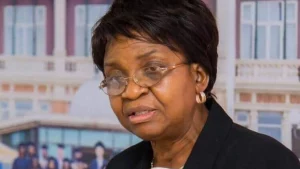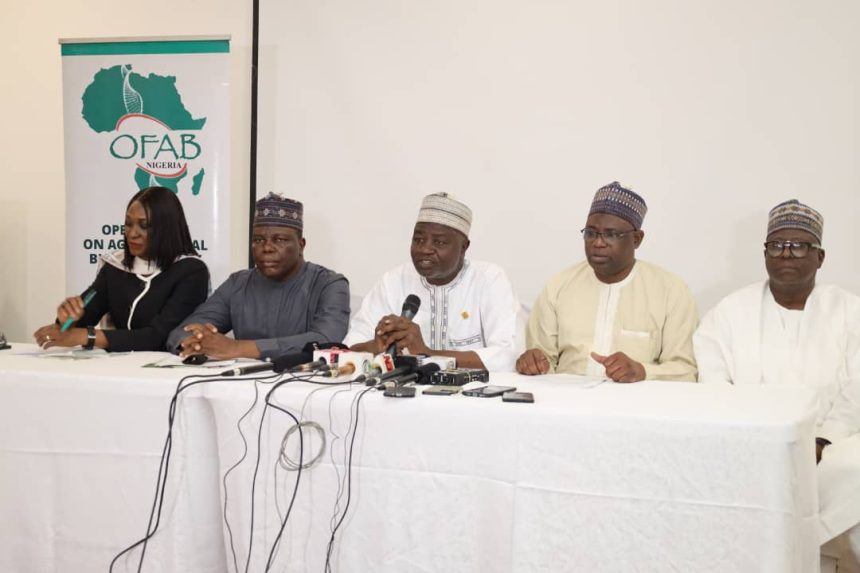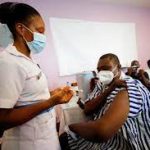Knock head of country’s food, drug agency for ‘unscientific’ comment on GMOs
A coalition of Nigeria’s agricultural research system led by the country’s lead agricultural research body, the Agricultural Research Council of Nigeria (ARCN) has affirmed that all genetically modified crops that have been developed and released in the country are safe and pose no harm to humans, animals, and the environment.
The group comprising of National Biotechnology Research and Development Agency (NBRDA), National Agricultural Seed Council (NASC), National Agricultural Quarantine Service (NAQS), Sheda Science and Technology Complex (SHESTCO), and National Biosafety Management Agency (NBMA) also unanimously decried what they described as unfounded criticism of genetic modification, saying they all lack scientific basis.
The coalition’s position comes on the heels of the recent media campaign against GM technology in the country. The group noted that the campaigners were bent on turning the country into a dumping ground for GMOs produced in other countries negating the huge manpower available in the country.
Leading other Chief Executives in addressing the press on Thursday in Abuja, ARCN Executive Secretary, Prof. Garuba Sharubutu, said that the Council, which is saddled with the responsibilities of advising the Federal Government of Nigeria on National Policies and priorities in agricultural research, training, and extension activities including research into the application of biotechnology research in agriculture to improve crop plants and livestock breed thereby increasing their productivity and boost food security of the nation, has performed this role reputably, attracting global accolades from the scientific world.
Speaking on the day, Sharubutu said, ARCN which superintends 16 research entities, also have the mandate for genetic improvement of all staple and cash crops, livestock and fisheries.
“In achieving these mandates, the application of agricultural biotechnology in their research activities offers a novel way to develop varieties of crop plants and livestock breeds that are resilient to stresses arising from the impact of climate change and the quest to increase crop productivity by addressing farming problems,” Sharubutu said.
According to him, “Biotechnology has been used successfully to increase productivity in corn, soybean and cotton by combating insect pests and drought in other parts of the world including USA, Europe, Brazil, Argentina and South Africa” he noted.
In his address, Director General NABRDA, Prof. Abdullahi Mustapha said the ongoing debate regarding the safety of GMO plants on human and environmental health in Nigeria has been reignited by the introduction of the Tela Maize, sparking controversy, misinformation, and misunderstanding.

This, he said has resulted in widespread fear and skepticism among the public.
“Our aim with this event is to alleviate public concerns, dispel misinformation, and educate the nation on the proven safety and advantages of GMOs.
“GMOs represent a crucial advancement in the field of biotechnology, offering a myriad of benefits that span across agriculture, food security, health, industry, and the environment. These genetically modified organisms have the potential to revolutionise our approach to addressing pressing global challenges such as food scarcity, malnutrition, and environmental sustainability,” Prof Mustapha said.
He further disclosed that, by harnessing the power of genetic engineering, Nigerian scientists and researchers have developed crops that are more resilient to pests, diseases, and adverse climate conditions, thus ensuring a more secure food supply for present and future generations. He listed some of these crops to include Bt Cowpea, Bt Cotton and the newly released Tela Maize.
He noted that by adopting and adapting genetically modified crops, Nigeria can increase food security, improve crop yields, and reduce the use of harmful pesticides. It is time to move past the fear and skepticism surrounding GMOs and embrace this cutting-edge technology for the benefit of all Nigerians.
Speaking on the safety Director General, NBMA, Dr Agnes Yemisi Asagbra said that NBMA remained committed to ensuring the safety and responsible regulation of GMOs in Nigeria.
“The NBMA is Nigeria’s sole authority on biosafety matters. We enforce standards, guidelines, and risk assessment procedures for GMOs. Our commitment is rooted in the National Biosafety Management Agency Act and its regulations.
While concerns exist about long-term effects, the current scientific consensus—supported by the NBMA—is that GMO foods approved for consumption in Nigeria are safe. This is because rigorous risk assessments guide our decisions.
“Before granting approvals for any genetically modified organism (GMO), NBMA conducts rigorous risk assessments. These assessments evaluate potential risks to human health, the environment, and biodiversity. The process involves scientific experts who analyze data, conduct experiments, and assess the safety of the GMO in question. The NBMA considers factors such as allergenicity, toxicity, and unintended effects resulting from genetic modifications,” she noted.
According to the Director General, NBMA actively engages with the public, stakeholders, and relevant organizations on biosafety, especially as it relates to safety of humans, the plants, and preservation of biodiversity in Nigeria.
Asagbra, however, express regrets over the comment of the Director General of the National Agency for Food and Drug Administration and Control (NAFDAC), saying it is unexpected of a leader of a high ranking scientific institution that have been an active part of the country’s biosafety technical sub-committee.
The NAFDAC DG, Professor Christiana Adeyeye has come under fire from the scientific community over her comment during an appearance on Arise TV, saying ‘GMOs are not safe.’
Her comment has been described ‘unscientific’ by several scientists who said, saying she is not aware of any study to ascertain the safety of GMOs in Nigeria negates the truth.
Commenting on this during the press conference on Thursday, the NBMA DG said, “NAFDAC has been part of what we do at NBMA, including on GMOs. In April, we had a meeting on this, where NAFDAC was represented by a senior Director on the directive of the DG.”
Asagbra said, NBMA have and would continue to embark of public consultations, workshops, and information dissemination in ensuring that the lives of Nigerian, the plants, and the entire biodiversity of the country are safeguarded.
Meanwhile, Dr Kahild Ishiak, Acting Director General, National Agricutural Seeds Council (NASC) used the occasion to debunk insinuations relating to the viability and safety of GMOs seeds.
On the notion that seeds from harvested GM materials cannot be replanted is not correct, Dr Ishaik said, “Seeds from GM materials that have been bred in Nigeria can be replanted. However, as with the conventional seeds, we have always advised farmers to always buy new seeds for optimal yield gain. Planting the offspring or farmer’s safe seeds from harvested materials may lead to yield low by about 10-15% and up to 25% in some instances.”
Similarly, Architect Kabiru Ibrahim, President, All Farmers Association of Nigeria (AFAN), has said the attack on GMOs in Nigeria is not in the interest of the Nigerian farmers.
He said, “GMOs have given the Nigerian farmers an opportunity for better earning. We have planted the crops and have seen that all that the anti-GMOs have alleged have not been found in the crops.”
Meanwhile, the ARCN Executive Director disclosed that all the opposing messages against GMOs in Nigeria, particularly, TELA Maize have been on the social media, as he said none of all the institutions under the Nigeria research system has received any form of query from the anti-GMOs, despite the availability of outlets and platforms deliberately created to accommodate such.





